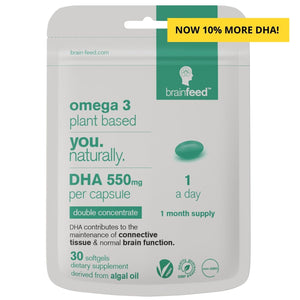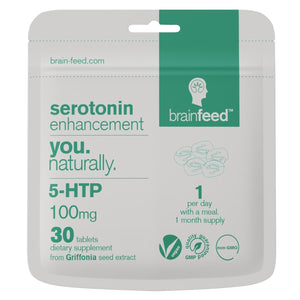Good fats for a great brain: Which fats are good for you?
filter
Key points
- Your brain is 60% fat in structure, making it critical for brain function
- A special omega 3, DHA, helps maintain normal brain function
- Good fats vs bad fats: switch trans fats like margarine for omega 3-rich
Your diet plays a major role in your health, including brain health. The nutritional effects of fats have been a health debate for decades. The type of fats you consume can directly impact brain health. Some of the best foods for brain health are rich in healthy fats. Find more about good fats vs bad fats. And how your brain benefits from healthy fats.
Why a fatty brain is a healthy brain?
If you look at the structural composition of your brain, you will find that 60% of your brain is made of fat [1 Trusted Source 2009 - Acta Neurologica Taiwanica Research evaluation Essential fatty acids and human brain ] . Every brain cell has a layer of fat that protects them. This means that the fats you consume can protect your brain and ensure proper functioning. To keep your brain in optimal condition, it is necessary to nourish it with the good fats by replacing unhealthy fats. One of the most important fats for your brain is DHA because it makes up 25% of the brain’s structure [2 Trusted Source 2011 - Biochimie Research evaluation Docosahexaenoic acid (DHA) and the developing central nervous system (CNS) - Implications for dietary recommendations ] . It is a type of omega 3 fats (group of beneficial fats) that need to be supplemented in your diet. Some dietary fats like saturated fats can negatively impact your brain and must be limited.
Know your fats: Which fats are good for you ?
A typical Western diet is high in fat content. Animal fats, deep-fried foods, and bakery products, commonly consumed by the majority of the population are high in unhealthy fats, including saturated fats [3 Trusted Source 2019 - Advances in Nutrition Research evaluation Dietary Fats ] . Other unhealthy fats called trans-fat are found in bakery products, margarine, and frozen baked products. Trans fats are originally sourced from plant oils and then chemically altered to increase shelf life. These must be limited.
The good news is that there are many healthy fats that can nourish your brain. So what food is good for brain function? Those that contain healthy fats. Fats found in nuts, avocado and olive oil called MUFA bring health benefits. If you are looking for brain-specific benefits, omega 3 fats such as EPA and DHA are great fats for the brain. Fatty fish and algae are foods high in omega 3 fats. ALA is a type of omega 3 found in flaxseed and chia seeds. Amongst all these healthy fats, DHA takes the crown for the best fat for brain health due to its structural and functional contribution. Your brain needs a steady supply of DHA to work like a well-oiled machine with shiny parts. If you are low on DHA rich food sources, a smart way to ensure sufficient intake is through supplementation. brain feed has produced a double concentrated DHA derived from algae and provides 550mg DHA in a single vegan capsule. Read more here.
3 reasons why DHA is great for brain health.
-
Better cognition
As you grow older, it is expected to have normal cognitive delays. The good news is you can strengthen your cognition in old age and prepare for it while you are young. DHA is a great nutrient that promotes brain power. When older adults were supplemented with DHA for 24 weeks, they saw an improvement in learning and memory scores [6 Trusted Source 2010 - Alzheimer's & Dementia Human study Beneficial effects of docosahexaenoic acid on cognition in age-related cognitive decline ] . An important protein in your brain is responsible for building new cells and connections and is called BDNF. It is involved in learning and memory. DHA increases the levels of BDNF [7 Trusted Source 2020 - Scientific Reports Animal study Plasma BDNF is a more reliable biomarker than erythrocyte omega-3 index for the omega-3 fatty acid enrichment of brain ] . -
Protective against dementia
Many animal and human studies have shown the benefits of DHA supplementation in protecting against dementia. One cause of dementia is increased production of harmful compounds in the brain and increased inflammation. A review of 17 studies showed that supplementing with DHA decreased the production of these compounds and inflammation, thus protecting your brain [5 Trusted Source 2018 - Prostaglandins, Leukotrienes and Essential Fatty Acids Research evaluation Docosahexaenoic acid (DHA): An essential nutrient and a nutraceutical for brain health and diseases ] . -
Stronger brain network
Your brain functions by sending messages across its 80 billion cells [4 Trusted Source 2019 - Asia Pacific Journal of Clinical Nutrition Research evaluation Docosahexaenoic acid and the brain- what is its role? ] . These cells have strong networks that connect them. DHA is one of the compounds that makes this possible. Brain cells that were treated with DHA demonstrated rapid growth with longer lengths and extensive branching to enable better connections [4 Trusted Source 2019 - Asia Pacific Journal of Clinical Nutrition Research evaluation Docosahexaenoic acid and the brain- what is its role? ] .
3 reasons why unhealthy fats must be limited.
-
Increased Alzheimer’s risk
Saturated and trans fats have been linked to the production of compounds that can clog your brain cells, commonly seen in Alzheimer’s patients, called amyloid-beta and tau proteins. Those with the highest intake of saturated fat had 70% higher risk of getting Alzheimer’s [9 Trusted Source 2015 - The Science Journal of the Lander College of Arts and Sciences 3rd-party source Is There a Link between Saturated Fat Intake and Alzheimer’s disease? ] . Similarly, those with high levels of trans fat were found to have 50% to 75% higher risk of Alzheimer’s disease or dementia [10 Trusted Source 2019 - Neurology Human study Serum elaidic acid concentration and risk of dementia: The Hisayama Study ] . Increasing DHA and decreasing saturated fat intake can limit this damage. -
Lower cognition
Saturated fats are detrimental to physical and cognitive health. When obese men were fed a meal high in saturated fats, their cognitive tests scores decreased [8 Trusted Source 2022 - Physiology & Behavior Human study A meal enriched in saturated fat acutely impairs cognitive performance in obese men ] . Replacing unhealthy fats with healthy fats is protective towards brain health. In a study where participants were supplemented with 30ml (2tbsp) of extra virgin olive oil (high in healthy fats) for 6 months, they saw improvement in structural component of the brain and improved cognitive scores [11 Trusted Source 2022 - Nutrients Human study Extra-Virgin Olive Oil Enhances the Blood–Brain Barrier Function in Mild Cognitive Impairment: A Randomized Controlled Trial ] -
Low mood
Saturated fats increase the production of harmful compounds and promote brain inflammation. Many studies have linked this to depressive symptoms [12 Trusted Source 2019 - Frontiers in Neuroscience Systematic and meta-analysis Diet-Derived Fatty Acids, Brain Inflammation, and Mental Health ] . Another way these fats promote low mood is by limiting the availability of your happy brain chemical’s (serotonin) building block, tryptophan. Low tryptophan in the brain means that your brain’s production of serotonin is decreased. One way to navigate this is through intake of the direct precursor of serotonin, called 5-HTP which is available in supplemental form. The world’s smallest dense tablet of 100mg 5-HTP can naturally and safely increase serotonin levels.
To run your body’s supercar efficiently, fuel it with the right kind of fuel. Limit intake of saturated and trans fats and increase intake of DHA, and other healthy fats. It is a simple exchange that can vastly improve brain health.
References
- Chang, C. Y., Ke, D. S., & Chen, J. Y. (2009). Essential fatty acids and human brain. Acta neurologica Taiwanica, 18(4), 231–241. https://www.researchgate.net/publication/42438067_Essential_fatty_acids_and_human_brain
- Guesnet, P. et al. (2011). Docosahexaenoic acid (DHA) and the developing central nervous system (CNS) - Implications for dietary recommendations. Biochimie, [online] 93(1), pp.7–12. https://www.sciencedirect.com/science/article/abs/pii/S0300908410001823?via%3Dihub
- Catherine J Field, Lindsay Robinson (2019). Dietary Fats. Advances in Nutrition, Volume 10, Issue 4, Pages 722-724, ISSN 2161-8313. https://www.sciencedirect.com/science/article/pii/S2161831322004136?via%3Dihub
- Sinclair A. J. (2019). Docosahexaenoic acid and the brain- what is its role?. Asia Pacific journal of clinical nutrition, 28(4), 675–688. https://www.airitilibrary.com/Article/Detail/09647058-201912-201912130001-201912130001-675-688
- Sun, G. Y., Simonyi, A., Fritsche, K. L., Chuang, D. Y., Hannink, M., Gu, Z., Greenlief, C. M., Yao, J. K., Lee, J. C., & Beversdorf, D. Q. (2018). Docosahexaenoic acid (DHA): An essential nutrient and a nutraceutical for brain health and diseases. Prostaglandins, leukotrienes, and essential fatty acids, 136, 3–13. https://www.plefa.com/article/S0952-3278(16)30213-7/abstract
- Yurko-Mauro, K., McCarthy, D., Rom, D., Nelson, E. B., Ryan, A. S., Blackwell, A., Salem, N., Jr, Stedman, M., & MIDAS Investigators (2010). Beneficial effects of docosahexaenoic acid on cognition in age-related cognitive decline. Alzheimer's & dementia : the journal of the Alzheimer's Association, 6(6), 456–464 https://alz-journals.onlinelibrary.wiley.com/doi/10.1016/j.jalz.2010.01.013
- Sugasini, D., Yalagala, P. C. R., & Subbaiah, P. V. (2020). Plasma BDNF is a more reliable biomarker than erythrocyte omega-3 index for the omega-3 fatty acid enrichment of brain. Scientific reports, 10(1), 10809. https://www.nature.com/articles/s41598-020-67868-9
- Ruegsegger, G. N., Rappaport, C. I., Hill, J. J., Jochum, K. A., Challeen, E. S., & Roth, M. C. (2022). A meal enriched in saturated fat acutely impairs cognitive performance in obese men. Physiology & behavior, 244, 113664. https://www.sciencedirect.com/science/article/abs/pii/S0031938421003516?via%3Dihub
- Konig, J. (2015). Is There a Link between Saturated Fat Intake and Alzheimer’s disease? The Science Journal of the Lander College of Arts and Sciences, [online] https://touroscholar.touro.edu/sjlcas/vol8/iss2/7/
- Honda, T., Ohara, T., Shinohara, M., Hata, J., Toh, R., Yoshida, D., Shibata, M., Ishida, T., Hirakawa, Y., Irino, Y., Sakata, S., Uchida, K., Kitazono, T., Kanba, S., Hirata, K. I., & Ninomiya, T. (2019). Serum elaidic acid concentration and risk of dementia: The Hisayama Study. Neurology, 93(22), e2053–e2064. https://www.neurology.org/doi/10.1212/WNL.0000000000008464
- Kaddoumi, A., Denney, T. S., Jr, Deshpande, G., Robinson, J. L., Beyers, R. J., Redden, D. T., Praticò, D., Kyriakides, T. C., Lu, B., Kirby, A. N., Beck, D. T., & Merner, N. D. (2022). Extra-Virgin Olive Oil Enhances the Blood-Brain Barrier Function in Mild Cognitive Impairment: A Randomized Controlled Trial. Nutrients, 14(23) https://www.mdpi.com/2072-6643/14/23/5102
- Melo, H. M., Santos, L. E., & Ferreira, S. T. (2019). Diet-Derived Fatty Acids, Brain Inflammation, and Mental Health. Frontiers in neuroscience, 13, 265. https://www.frontiersin.org/journals/neuroscience/articles/10.3389/fnins.2019.00265/full


 alertness
alertness
 cognition
cognition
 sleep
sleep
 wellbeing
wellbeing










Leave a comment
Open tab